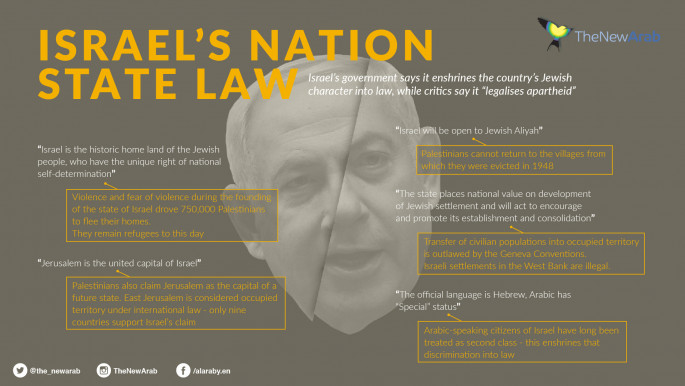
Joint List chooses the butcher's other hand: Benny Gantz
As the third largest bloc in the Knesset, Ayman Odeh and his MPs have moved decisively to oust Netanyahu by aligning with the Khaol Lavan (The Blue and White centrist liberal alliance).
As Netanyahu has been a particularly devastating leader for the Palestinians and the Arab citizens of Israel, the Joint List has chosen the butcher's other hand: Benny Gantz.
Gantz has an atrocious human rights record, is allied with far-right extremist parties (as is Netanyahu), and has promised the implementation of Trump's "Deal of the Century," which includes the displacement of Palestinian citizens of Israel in a so-called "land swap".
Gantz has also bragged about killing Palestinians during past electoral campaigns. The political tranquility he currently presents is a façade, masking what the former IDF chief is truly capable of doing to harm Israel's Arab minority and Palestinians in the occupied territories.
His welcoming of the Joint List's endorsement solely serves his motivation to unseat Netanyahu, and ironically echoes an old Arab idiom: "My brother and I against my cousin, and my cousin and I against the stranger." It is the perfect demonstration of enemies becoming allies of convenience.
The coalition against Netanyahu is worth a shot. What's the worst that could happen?
 |
Their marginal influence will not necessarily grant them the ability to legislate, but it will help mitigate damage to basic Palestinian rights |  |
The worst has already happened, be it in the form of the Nation State Law, the acceleration of settlement building, or the continued Israeli army atrocities. While it may seem hypocritical for the representatives of Palestinians in Israel to help someone like Gantz become the prime minister, it is a strategic move away from politics of protest to politics from within.
Their marginal influence will not necessarily grant them the ability to amend or introduce laws, but it will help mitigate damage to the basic rights of their constituents.
The Joint List continues to be the only party representing minority needs in Israeli politics. Its victory provides an opportunity to elevate its political platform and challenge the uncritical pro-Israeli foreign policies of other nations, but only if the MPs are able to wield their limited power effectively.
 |
|
| [Click to enlarge] |
The endorsement of Gantz is not as historic as holding 15 seats in the Knesset, gaining 20,000 votes from non-Arab citizens, introducing the first hijabi woman in Israeli politics and the first woman to represent the Islamic Movement party, Iman Khatib-Yassin, and the youngest female lawmaker at 34, Sundus Salih.
The 15-member bloc has the opportunity to dedicate the next four years to modeling leadership at home and abroad, demonstrating the Arab community's embrace of gender equality, highlighting the conditions that minorities live under in Israel, and championing equality in the harsh reality of coexistence.
In seizing this political moment, the unheard minority of Israel can declare themselves party to the debate on the question of Palestine as one of the often forgotten groups in the Palestinian-Israeli conflict. Perhaps then, some progress can be made.
While the weight of their seats is significant when it comes to coalition-building, it is small compared to a Knesset of 120 members, most of whom consider these MPs and their constituents to be inferior, if not terrorists.
 |
In seizing this political moment, the unheard minority of Israel can declare themselves party to the debate on the question of Palestine |  |
Racism in Israeli society is an impediment to Arabs ever being considered equal; it is so deeply ingrained that it likely will only be resolved through generational shifts in attitudes. This could begin with Gantz sticking to his promise of forming a government that serves all Israeli citizens alike, a fantasy so far unlikely to materialise.
Due to the coronavirus crisis, negotiating a unity government has been halted and the Knesset has been shuttered, giving Netanyahu full control of Israel, for now.
Timing is indeed everything: the Joint List's endorsement may have held more weight and garnered more attention had there not been a global pandemic that gives Netanyahu emergency jurisdiction. The pandemic will now allow the Likud leader to hold onto power and exacerbate human rights abuses in Israel and in the occupied Palestinian territories - he will go unscrutinised in this time of emergency, and he may be able to gain political momentum in the process.
Even if Netanyahu's favourability isn't boosted when the health crisis is contained, and even if Gantz betrays the Joint List or proves to be worse than Netanyahu in the long term, an attempt at a coalition with the center-right is worth a shot.
The Palestinian people and the Arab citizens have already been through the worst of Israel - one more futile political move will hardly change the situation.
Laura Albast is Palestinian-American. She holds degrees from the American University of Beirut and Boston University, and works at an NGO in Washington, D.C.
Follow her on Twitter: @Lau_Bast
Opinions expressed in this article remain those of the author and do not necessarily represent those of The New Arab, its editorial board or staff.


![President Pezeshkian has denounced Israel's attacks on Lebanon [Getty]](/sites/default/files/styles/image_684x385/public/2173482924.jpeg?h=a5f2f23a&itok=q3evVtko)



 Follow the Middle East's top stories in English at The New Arab on Google News
Follow the Middle East's top stories in English at The New Arab on Google News


